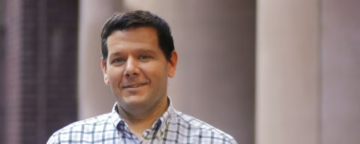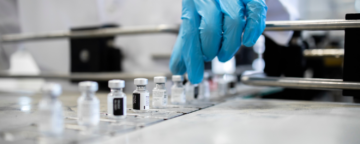Belief in conspiracy theories about the coronavirus pandemic is not only persistent but also is associated with reluctance to accept a COVID-19 vaccine when one becomes available and to engage in behaviors such as mask-wearing that can prevent its spread, according to researchers at the Annenberg Public Policy Center.
In a new study, based on a two-wave national panel survey conducted in late March and mid-July, the researchers find that belief in conspiracy theories about the source and seriousness of the pandemic persisted across the four-month period. These beliefs in March were associated with increasing reluctance to adopt preventive behaviors in July, including actions such as mask-wearing and accepting a vaccine when one is available.
“Belief in pandemic conspiracy theories appears to be an obstacle to minimizing the spread of COVID-19,” said Dan Romer, research director of the Annenberg Public Policy Center (APPC) of the University of Pennsylvania, who co-authored the study with APPC director Kathleen Hall Jamieson. “To control the pandemic we need high rates of mask-wearing, physical distancing, and hand-washing now – and of vaccination when a safe and effective vaccine is available.”
The study was published today in the journal Social Science & Medicine.
Widespread belief in conspiracy theories
Researchers assessed belief in three COVID-19 conspiracy theories in March and July among 840 U.S. adults on a survey panel and found that high proportions believed in them at both times:
- More than 1 in 4 people (28%) in March reported believing that the Chinese government created the coronavirus as a bioweapon, a proportion that increased to 37% in July;
- Nearly 1 in 4 (24%) believed in March that some in the U.S. Centers for Disease Control and Prevention, or CDC, are exaggerating the danger posed by the virus in order to damage Donald Trump’s presidency, which increased to 32% in July;
- Nearly 1 in 7 (15%) believed that the pharma industry created the virus to increase sales of drugs and vaccines, which edged up to 17% in July.
Heavy use of conservative media or social media was associated with a greater likelihood that people would report believing in these theories. This study extends prior APPC studies which found that people who rely on social media were more likely to be misinformed about vaccines and that people who used conservative or social media at the outset of the COVID-19 pandemic were more likely to believe conspiracy theories about it and to be misinformed about how to prevent the virus.
“Conspiracy theories are difficult to displace because they provide explanations for events that are not fully understood, such as the current pandemic, play on people’s distrust of government and other powerful actors, and involve accusations that cannot be easily fact-checked,” Jamieson said.
In the study, the authors argue that counteracting the effects of conspiracy beliefs will require “continued messaging by public health authorities on mainstream media and in particular on politically conservative outlets that have supported COVID-related conspiracy theories.”
Conspiracy theories and vaccination intentions
The researchers found that belief in conspiracy theories was inversely related to the perceived threat of the pandemic; taking of preventive actions, including wearing a face mask; and the intention to be vaccinated when there is a COVID-19 vaccine.
Assessing people’s COVID-19 vaccination plans, researchers found a widening gap over time between people who most strongly believed the COVID-19 conspiracies and those who did not believe them.
In March, those who did not believe the conspiracies were 2.2 times more likely to intend to be vaccinated than those who most strongly believed in the conspiracies – a ratio that had widened to 3.5 times in July:
- In March, 37% of people who most strongly believed in these three conspiracy theories reported that they intended to be vaccinated, compared with 81% of the people who did not believe in them.
- By July, the vaccination intention rates were 22% for those who most strongly believed in these conspiracies and 76% for those who did not believe in them.
Believers in the coronavirus conspiracies were also more likely to have doubts about the safety of the measles, mumps, and rubella vaccine (MMR), a concern that appeared to play a role in their heightened hesitancy to accept a vaccine for COVID-19.
Conspiracy theories and mask-wearing
The first wave of the survey was conducted before the CDC advised people in early April to wear nonsurgical masks as a preventive measure when they go out in public.
In July, among those who were most likely to believe in the COVID-19 conspiracies, 62% reported wearing a mask every day that they went outside of the home and had exposure to others – compared with 95% of those who did not believe in the conspiracies.
In other words, those who did not believe in the conspiracies were 1.5 times more likely to wear a mask every day outside of the home when they were in contact with others than the people who most strongly believed in the conspiracies.
Group differences and conspiracy beliefs
Members of historically disadvantaged racial and ethnic groups were more likely to believe the conspiracies, a finding which is rendered even more troubling because communities of color are disproportionately suffering the effects of COVID-19. However, older adults were less likely to believe the conspiracies, which is good news because they are more likely to suffer from the disease.
One positive note was that political ideology was not related to changes in vaccination intentions from March to July. This was in contrast to mask-wearing; the July survey found that liberals were more likely than conservatives to adopt mask-wearing.
The survey
The research is based on a national probability survey of l,050 U.S. adults conducted between March 17-27, 2020, and a follow-up with 840 of the same individuals between July 10-21, 2020. The analysis was based on 840 individuals who took part in both waves.
Both waves of the survey were conducted before one conspiracy theory – that CDC scientists are seeking to undermine the president – was voiced in September by Michael R. Caputo, the top communications official at the U.S. Department of Health and Human Services. He made a Facebook Live video in which he accused government scientists of “sedition” and the CDC of harboring a “resistance unit” against the president. He subsequently apologized.
“Conspiracy theories as barriers to controlling the spread of COVID-19 in the U.S.” was published online in Social Science & Medicine on September 21, 2020: https://doi.org/10.1016/j.socscimed.2020.113356
Download this news release.


